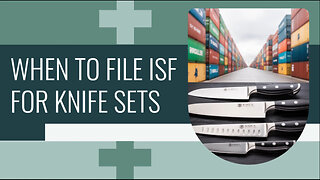Premium Only Content

Demystifying Importer Security Filing : A Step-by-Step Guide to Compliance
License To Import // 323-578-6432 // file@licensetoimport.com // www.licensetoimport.com
Importer Security Filing (ISF), also known as 10+2 filing, is a requirement implemented by US Customs and Border Protection (CBP) to enhance security measures for ocean freight arriving in the United States. This filing requires importers or their customs brokers to submit certain information about the cargo being imported at least 24 hours before it is loaded onto a vessel bound for the US. The purpose of ISF is to help CBP identify and assess any potential security risks.
To comply with ISF requirements, the first step is to have a valid customs bond. A customs bond is a financial guarantee between the importer, the surety company, and CBP that ensures all duties, taxes, and fees owed to the government will be paid. Without a customs bond, your goods may be held at the port until the bond is in place. It's crucial to work with a licensed customs broker who can assist you in obtaining a customs bond.
Once you have a customs bond, the next step is to gather all the necessary information for the ISF filing. This includes details about the importer of record, consignee, seller, and container stuffing location, among others. It's important to have accurate and complete information to avoid delays or penalties.
After gathering the required information, you can submit the ISF filing to CBP. This can be done electronically through the Automated Broker Interface (ABI) system using a licensed customs broker or through a self-filing option. Customs brokers often have advanced software that streamlines the filing process and ensures accuracy and compliance.
Once the filing is submitted, CBP will review the ISF information to assess any potential security risks associated with the cargo. If CBP identifies discrepancies or concerns, they may request additional information or conduct a physical examination of the goods. It's crucial to respond promptly and provide any requested information to avoid delays in the release of your goods.
Complying with ISF requirements has several benefits. It helps CBP identify and mitigate security risks, contributing to the safety and security of the supply chain. It also helps avoid penalties, delays, and additional costs associated with non-compliance.
In conclusion, complying with Importer Security Filing requirements is crucial for anyone involved in international trade. It ensures the smooth flow of goods and enhances security measures for ocean freight arriving in the United States. Working with a licensed customs broker who can guide you through the process is highly recommended.
#usimportbond #isfcustomsbroker #uscustomsclearing #isfentry
Video Disclaimer Here: This video is solely for education and is not endorsed by any US government agency.
00:27 Importer Security Filing (ISF)
00:58 Compliance with ISF
01:37 Benefits of ISF compliance
-
 1:39
1:39
License To Import
24 days agoWhen To File ISF For Knife Sets
9 -
 LIVE
LIVE
Dr Disrespect
1 hour ago🔴LIVE - DR DISRESPECT - WARZONE - RAGE ON THE MAIN STAGE
1,023 watching -
 LIVE
LIVE
Steven Crowder
3 hours ago🔴Game Over: Trump's EU Trade Victory Shows How Stupid "Experts" Really Are
33,808 watching -
 LIVE
LIVE
The Charlie Kirk Show
26 minutes agoTHE CHARLIE KIRK SHOW IS LIVE 07.28.25
3,874 watching -
 LIVE
LIVE
Anthony Pompliano
40 minutes agoWhy Bitcoin Will EXPLODE During The AI Era
208 watching -
 1:06:00
1:06:00
The Rubin Report
1 hour agoMajor Company’s Must-See Ad May Be the Official Death of Woke
6.17K11 -
 LIVE
LIVE
Robert Gouveia
1 hour agoBongino's "SHOCKING" Bombshell! Peter Strozk PANIC! Trump Assassin Case! Climate Change PLOT!
1,152 watching -
 LIVE
LIVE
LFA TV
17 hours agoLFA TV ALL DAY STREAM - MONDAY 7/28/25
5,235 watching -
 LIVE
LIVE
Grant Stinchfield
25 minutes agoImporting Capital, Not Chaos: The Pro-America Visa
101 watching -
 LIVE
LIVE
Flyover Conservatives
11 hours agoTRUMP’S $1.9 TRILLION TRADE BOMBSHELL—EU & JAPAN BOW TO THE DEALMAKER - Dr. Kirk Elliott; Are We Watching History Repeat? Nazi Playbook vs. Modern Democrats | FOC Show
226 watching